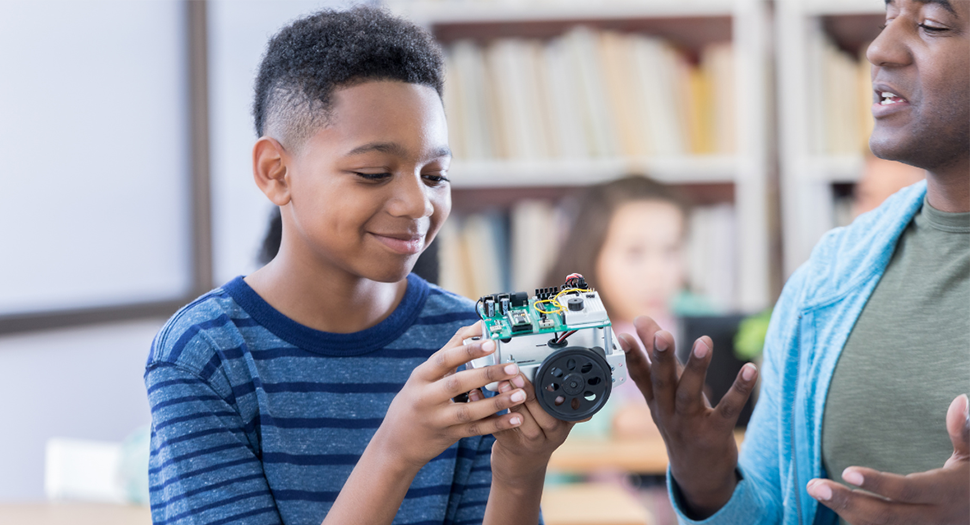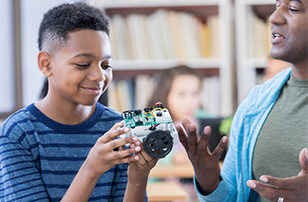Gen Z is a remarkable generation. As digital natives with a collective desire for agency and independence, young people today want to drive the conversation when it comes to their career goals, instead of passively following paths provided to them.
At ASA, we’ve conducted extensive research on how Gen Z makes decisions, and what motivates this generation to take action. While kids want to chart their own courses, they still need adults to help guide them toward their goals.
So, how can we balance the need for agency with the need for mentorship? How can adults place the self-driven goals of young people to create impactful mentoring experiences?
I recently had the opportunity to moderate an enlightening panel discussion around placing Gen Z agency, advocacy, and decision-making at the center of mentorships. The panel featured a diverse range of insights from ASA’s own Dr. Kaylee Johnson, Ph.D.; Delia Hagan and Karina Nova of MENTOR National; Letta Neely of Apprentice Learning; Lanyshia Cespedes, peer leader and student at Apprentice Learning; Andrea Purcell of Big Picture Learning; and Izzy Fitzgerald, a college student and graduate of San Diego Met High School, a BPL school.
Here are my key takeaways from the conversation:
1) In order to best serve the needs of Gen Z in a mentorship setting, we must understand, holistically, what drives their decision-making.
Kaylee kicked off the discussion with a presentation on the considerations we must keep in mind for Gen Z as we prepare them for the future. Some of the most prominent include:
- Gen Z places a lot of emphasis on personal happiness and mental health—and uncertainty about the future and the decisions they must make is causing a great deal of stress and anxiety.
- Gen Z is relatively confident about the future, but they largely lack specifics. Most teens say they would benefit from more career-readiness learning.
- Most Gen Z students ASA surveyed say they are passionate about at least one social cause, but say they don’t have enough resources to take action.
- Social pressures (like friends/family), academic pressures (like grades and transitions), and contextual pressures (like money) contribute to feelings of trepidation about the future.
- “Living up to expectations” was noted as a top stressor among Gen Z students.
2) Gen Z’s decision-making journey starts and ends with self-reflection. This is key to effective mentorship.
The largest share of Gen Z is bringing in external advisors, like personal connections, media sources, and experts, after they’ve done research on their own.
The strong propensity for self-determination among Gen Zers must inform how we, as caring adults, approach any sort of mentorship engagement. This requires us to actively listen to the young people we work with, take their own personal goals seriously, and guide without dictating.
As Andrea stated, quoting a core component of BPL’s mission: “the community is the classroom and the student is the curriculum.” This requires us to take an interest-led approach in which we ask kids what they want to learn and pursue, and help them find the tools to get there, rather than prescribing a path for them.
Izzy spoke about how an expressed interest in politics and helping people eventually led to an internship at the San Diego mayor’s office while still in high school, with the help of a trusted advisor at the school. This experience, she said, taught her the importance of believing in her own abilities and overcoming “imposter syndrome” to bring her dreams to fruition.
She knew generally what she was interested in pursuing, and her adult mentor helped to illuminate the steps she could take to do so by listening and encouraging those interests.
3) We must work to close gaps and ensure that all kids have access to mentorship experiences. That includes acknowledging that we, as adults, must continuously learn and improve our approaches.
As Delia pointed out, 1 in 3 young people today do not have someone they consider a “mentor” outside of their own family. That’s why MENTOR takes a “relationship-centered” approach to education for their students.
“Relationships are a vehicle for growth and learning. If you don’t have positive relationships in your life as a student [in middle or high school], you’re not going to be connecting as much to new experiences and learning opportunities,” Delia explained.
Karina agreed, and further elaborated on how MENTOR mirrors this relationship-centered culture internally by regularly checking in with and learning from each other. Additionally, they consult the students themselves through a recently-launched Youth Ambassador Program and Youth Advisory Board Council to ensure they’re hitting the right marks for optimal outcomes. She also shared her own experience as a mentee, relaying how impactful that experience was for her in building her social capital and helping her into the position she’s in today.
4) Starting the career exploration process and equipping kids with critical skills early on is the best way to usher them confidently into the future.
Letta explained that Apprentice Learning begins providing work-based learning opportunities for students beginning in eighth grade in order to give them plenty of time to get to know themselves and their own interests with the help of caring adults.
Lanyshia, an Apprentice student, spoke about how she went into the program not knowing exactly what she wanted to pursue, but by participating in hands-on experiences, she now feels far less uncertain as she navigates her teen years. Even skills as seemingly “small” as learning how to take public transit on her own have vastly improved her confidence.
Lanyshia further explained that she has gained an interest in real estate by going on a work exploration and talking to professionals in the industry about what they do. This interest would likely not have come to be if she didn’t have this exposure at a young age.
As Letta so perfectly said: “What you see is what you can become.”
For more on the future of career readiness learning in K-12, subscribe to ASA’s newsletter, PivoteD!





